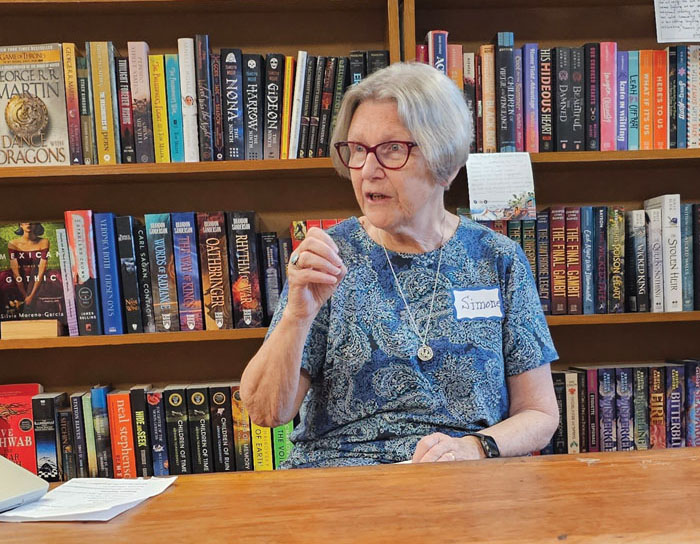Author, Medal of Freedom winner kicks off tour of the South in Salisbury
Published 12:09 am Tuesday, July 25, 2023

- Sister Simone Campbell at South Main Book Company Sunday night on the first stop of her southern tour to find out about all things South. Elisabeth Strillacci
SALISBURY — Sister Simone Campbell is not your typical nun. A lawyer, activist and religious leader who started out in California, she now resides in Washington, D.C., where for 17 years she served as executive director of NETWORK Lobby for Catholic Social Justice.
She is the author of the now-famous “nun’s letter” that, during the 2010 congressional debate about healthcare reform and the Affordable Care Act, was a pivotal turning point in eventually getting the ACA passed. She is the author of “Hunger for Hope” and “A Nun on the Bus.”
She has also organized and led numerous “Nuns on the Bus” tours across the country to talk about tax justice healthcare, economic justice, comprehensive immigration reform, voter turnout, bridging divides in politics and society and mending gaps in wealth and access in the nation.
In 2022, President Biden presented her with the Presidential Medal of Freedom.
And she is now on a trip through eight southern states for the “Hope in turbulent times” tour, working to discover what binds us in a time when division is running strong.
“I’ve been concerned about the divisions between us,” Sister Simone said Sunday at South Main Book Company. “We don’t seem to be able to talk to each other around our differences.” And as she continued to work on those communications, she said she realized she didn’t know much about the South, other than what she’s heard. So she decided to come to the South and learn.
She kicked off the nine-city tour here in Salisbury, choosing the book store because it seemed to be a place where diverse people might gather.
“I was hesitant to choose a church, one because churches can be partisan, and two, because I didn’t want to leave any other churches out,” she said in introducing herself to a group of about 15. “My goal is to learn the things I don’t know.” One of her first questions was “what would I get wrong about the South?”
“I think a lot of people hear our accent and assume we are uneducated,” said Karen Puckett. “I think a lot of people think we’re not very bright or well-informed.”
Alissa Redmond, who owns the bookstore, said when she first graduated from Duke, she thought she’d never come back to the South to live, feeling like her community was not here. But since she returned almost four years ago, she has found a group of friends, like-minded individuals who are making her rethink how she feels about the South and whether or not she will stay.
Tim Ward, who attended with his wife Shannon, said he agrees with the need to find community, but he worries that in doing so, we don’t hear the “other side,” don’t have a chance to listen to people who feel differently.
“And I think we need to listen and to talk with each other,” he said.
Geography was once a limiting factor in learning about others with different backgrounds, and some in the group mentioned that particularly for older southerners, especially farm families, there was not a lot of travel outside of the local area. Which meant exposure primarily to others who think and act like you.
“But now,” said Susan Lee, “with advances in technology and the fact that so many of us move away from our hometowns and home states for jobs, geography is not as limiting as it once was.” And having people move to the South from other places, bringing their ideas and behaviors with them has contributed to what she sees as at least some change in southern attitudes.
The tour is not the first time by far that Sister Simone has sought to learn about others. In 2016, she and a group of nuns attended both election conventions, where they ran a lemonade ministry. The halls were hot and crowded, so the nuns had a wagon with large coolers of lemonade, and as the delegates came through, they would offer cool lemonade and three questions.
“We asked them first ‘what worries you?’ and the answer was ‘our candidate.’ Then we asked ‘who in your family do you find it hard to talk to about politics’ and the answer was either Democrats or Republicans. But then we asked ‘what is your hope for the future?'” Sister Simone paused. “I don’t mean to make this partisan, but I have to say, the Republicans primarily didn’t have an answer. The Democrats could go on and on, but the Republicans really didn’t have a response to that.”
Sister Simone said her trip is not about continuing any divisions, but about learning from diverse groups across the board what life is like for those in the South, what concerns them, what the future looks like in their eyes, and what drives them.
“Just be careful if someone says ‘bless your heart,'” said Karen Puckett. She laughed, and then added “I do think we have made progress, and I do still have hope that we can talk to each other again.”



